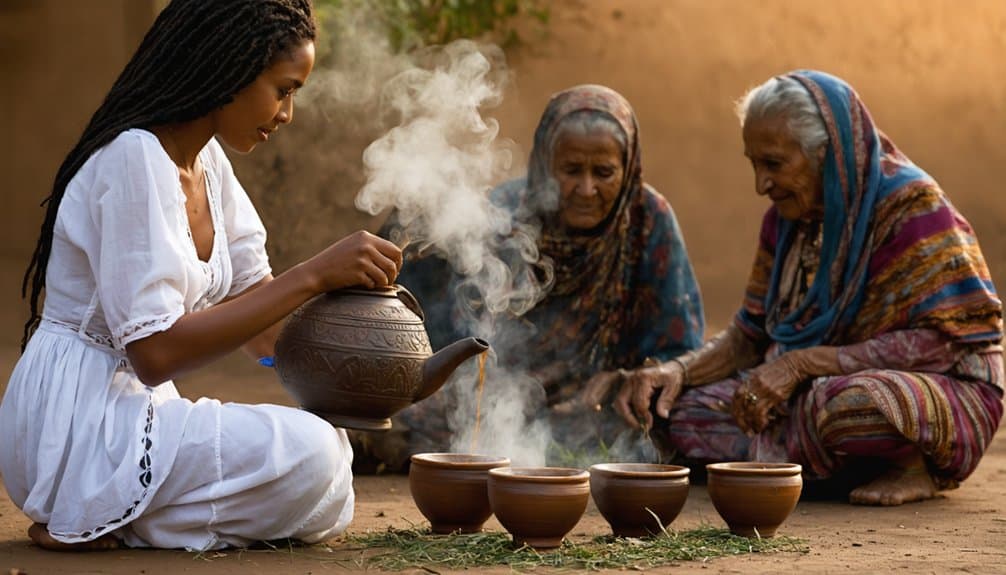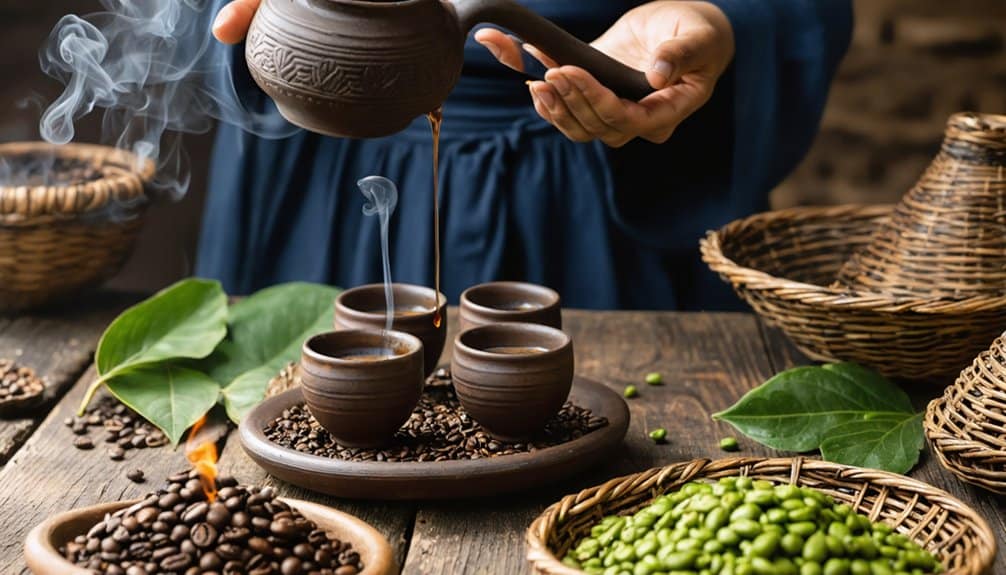Ethiopia’s coffee ceremony represents a profound sacred ritual that’s deeply woven into the nation’s cultural identity since the ninth century.
You’ll experience a meticulously crafted four-phase ceremony where coffee isn’t just brewed – it’s transformed through precise roasting, grinding, and brewing steps using traditional sacred vessels like the jebena clay pot.
Through shared prayers, incense, and three distinct brewing rounds, you’ll uncover how this ancient practice strengthens spiritual connections and social bonds in ways that transcend ordinary coffee consumption.
Key Takeaways
- The ceremony connects Ethiopians to their ancestral roots through a ritualistic preparation process dating back to the ninth century.
- Three sacred brewing rounds (Abol, Tona, Bereka) symbolize spiritual transformation and create a deeply meaningful communal experience.
- Burning incense, shared prayers, and traditional tools like the jebena clay pot elevate the ceremony beyond mere coffee consumption.
- The ritual fosters community bonds through storytelling and social connection, making it essential to Ethiopian hospitality and relationships.
- The meticulous preparation process demonstrates respect for coffee’s cultural significance, reflected in the saying “coffee is our bread.”
Origins and Ancient Roots of Ethiopia’s Sacred Coffee Ritual

While many cultures have adopted coffee as their preferred beverage, Ethiopia’s relationship with coffee runs deeper than mere consumption.
It’s here, in the ancient Kaffa region, where coffee’s story began with a goat herder named Kaldi and his energetic goats who uncovered the magical berries.
Dating back to the ninth century, this sacred ritual embodies Ethiopia’s spiritual and cultural essence.
You’ll find coffee’s significance woven into the nation’s very identity – it’s not just their primary export, but a living connection to their ancestors.
The ceremony you experience today carries the same reverence that has united communities for centuries.
The common saying that coffee is our bread perfectly captures how essential this beverage is to Ethiopian daily life.
The Sacred Art of Coffee Preparation and Brewing
The sacred art of Ethiopian coffee preparation unfolds through four distinct phases, each demanding meticulous attention and traditional expertise.
You’ll witness the skilled host carefully roasting green beans over a charcoal brazier until they reach the perfect brown hue, then grinding them in the traditional mukecha and zenezena.
Each serving produces three distinct brews, starting with the strongest Abol, followed by Tona, and ending with the lightest Bereka.
The brewing process reveals your host’s mastery through:
- Precise water temperature control in the clay jebena
- Expert timing of ground coffee incorporation
- Recognition of the steam signal marking completion
As incense fills the air and traditional snacks appear, you’re participating in a ritual that’s been connecting communities for generations.
Spiritual and Social Bonds Through Coffee Sharing

Sacred bonds emerge through Ethiopia’s coffee ceremony, where spiritual reflection intertwines with social connection to create profound moments of community bonding.
You’ll witness how the burning of incense and shared prayers transform an ordinary gathering into a reverent space that transcends religious and ethnic boundaries.
When you participate in this centuries-old ritual, you’re joining a tradition that strengthens the social fabric of Ethiopian society.
The ceremony invites you to pause, share stories, and build lasting relationships. It’s where national pride meets hospitality, where neighbors become family, and where every cup represents unity across Ethiopia’s diverse communities.
Declining an invitation to participate in the ceremony is considered highly disrespectful and can strain social relationships.
Traditional Tools and Sacred Vessels of the Ceremony
Central to Ethiopian coffee ceremony‘s authenticity are traditional vessels and tools that transform simple coffee preparation into a sacred art form.
At the heart of this ritual, you’ll find the distinctive jebena, a clay pot whose graceful spout creates the perfect stream for pouring your brew.
The setup typically includes woven grass or mats that provide a decorative foundation for the ceremony.
Three vital elements create the ceremony’s sacred atmosphere:
- The charcoal brazier, which roasts beans and heats water
- The wooden mortar and pestle, embodying ancient grinding traditions
- The small handleless cups, designed for sharing intimate moments
These tools aren’t merely functional—they’re sacred vessels connecting you to centuries of Ethiopian coffee culture.
The Three Sacred Rounds: Abol, Tona, and Buna

Three sacred rounds anchor Ethiopia’s revered coffee ceremony, each carrying profound spiritual significance.
You’ll experience abol initial – the strongest brew symbolizing transformation. While you may choose to drink just one cup or complete all three rounds, drinking only two is considered improper.
The second round, tona, invites contemplation with its gentler strength, while baraka, the final round, bestows blessings.
As the youngest serves the eldest initial, you’ll witness how each pour from height creates community.
The same grounds produce all three brews, growing progressively lighter yet deeply meaningful.
The ceremony often includes adding aromatic spices like cardamom to enhance the coffee’s complex flavors.
FAQs
How Long Does It Take to Master the Ethiopian Coffee Ceremony?
You’ll need several months to years of consistent practice, as mastering the Ethiopian coffee ceremony depends on your dedication to learning its precise steps and cultural nuances.
Can Men Perform the Traditional Ethiopian Coffee Ceremony?
While it’s not strictly forbidden, you’re swimming against the tide if you’re a man performing the ceremony – it’s traditionally a woman’s role, particularly the family matriarch’s sacred responsibility.
What Happens if Someone Declines to Participate in the Ceremony?
If you decline a coffee ceremony invitation, you’ll likely face social consequences – from strained relationships to potential community exclusion. You’re fundamentally rejecting both hospitality and cultural bonds.
Are There Specific Dress Codes for Hosts During Coffee Ceremonies?
In 90% of ceremonies, you’ll see hosts wearing traditional white cotton garments with colored woven borders. This attire symbolizes hospitality and respect while maintaining the ceremony’s cultural authenticity.
How Has Modernization Affected the Authenticity of Ethiopian Coffee Ceremonies?
While you’ll find modern adaptations like electric grinders and indoor settings, the ceremony’s core elements – communal bonding, traditional jebena, and spiritual significance – remain authentically preserved in urban Ethiopian culture.
The Bottom Line
You’ll find that Ethiopia’s coffee ceremony transcends mere beverage consumption – it’s a sacred thread binding communities together through shared moments of reverence and connection.
In a small village in Sidamo, you might witness grandmother Abebech performing the ritual as she has for 50 years, her practiced hands roasting beans over coals while three generations gather around her, breathing in the spiritual essence that transforms simple coffee into a holy communion.